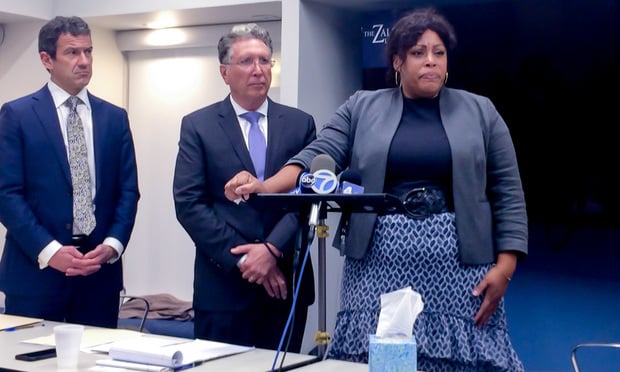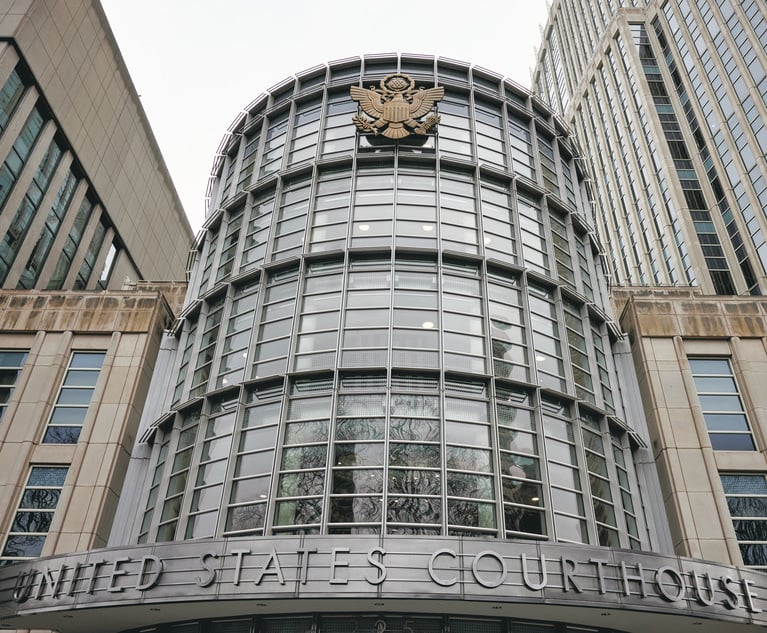'Stopped in My Shoes': NY Child Victims Act 'Imperative' to Brooklyn Friends School Plaintiff
As Amala Muhammed Redd laid out the abuse she suffered as a child, she also told of the moment when she learned about the Child Victims Act and how it was a revelation to her.
October 04, 2019 at 11:28 AM
8 minute read
 At a news conference Oct. 3, Dominique Penson of Barasch McGarry Salzman & Penson and Irwin Zalkin of Zalkin Law Firm listen as Amala Muhammed Redd, who is suing the Brooklyn Friends School after allegedly being abused in the 1980s, talks about how the New York Child Victims Act has allowed her to pursue legal action. (Photo by Jason Grant)
At a news conference Oct. 3, Dominique Penson of Barasch McGarry Salzman & Penson and Irwin Zalkin of Zalkin Law Firm listen as Amala Muhammed Redd, who is suing the Brooklyn Friends School after allegedly being abused in the 1980s, talks about how the New York Child Victims Act has allowed her to pursue legal action. (Photo by Jason Grant)
At a stirring news conference on Thursday, a 47-year-old woman who has filed a lawsuit against the Brooklyn Friends School after allegedly being abused and raped there by a janitor when she was 8 years old, described how the state's Child Victims Act has changed her life.
Standing in a Manhattan conference room before a contingent of reporters, Amala Muhammed Redd painfully detailed—sometimes while crying openly—how the male janitor called her out of her third-grade class repeatedly, and then told her to wait inside a darkened closet where he would soon abuse her. Then she also talked about the moment, earlier this year, when she learned about the Child Victims Act, and how hearing about what it meant for her—that after decades of pain, she could finally take legal action—was a revelation.
"I was kind of like stopped in my shoes," she said, describing the moment when, during her morning routine inside her Manhattan apartment, she heard a TV interview on MSNBC about the new act and how it would greatly expand—by more than 20 years—the age by which an alleged victim could bring a lawsuit against a child abuser or an institutional defendant.
"People like me suffer alone," she said, still talking about the morning when she learned of the act, which went into effect in August.
After listening to the report, Redd walked over to a computer inside her apartment, she told the Law Journal in post-news conference interview, and began searching for a lawyer to take her case.
She did her search, she said, before even calling her mother to tell her about the act, a law that she called "imperative."
 A photo of Amala Muhammed Redd taken around the time of the alleged incident. (Photo by Jason Grant)
A photo of Amala Muhammed Redd taken around the time of the alleged incident. (Photo by Jason Grant)She also explained that she'd met with three different attorneys in years past to talk about whether she could sue the man who'd abused her for months, or the school that she says allowed it to happen. But each time the lawyer sitting across from her had given her the same heart-dropping news: The statute of limitations on her potential lawsuit had expired. Nothing could be done.
Under the state's new act, which was signed into law by Gov. Andrew Cuomo in February, child sex abuse victims can launch civil cases until age 55, when previously they had been limited to age 23 for suing alleged abusers and to age 21 for suing related institutional defendants.
In recent years, state Sen. Brad Hoylman and Assemblywoman Linda Rosenthal, both Manhattan Democrats, had proposed versions of the law. But each year, their bill was opposed by the Catholic Church and the insurance industry, and Cuomo had publicly blamed the church for stopping it. But after last year's elections, both chambers of the Legislature became controlled by Democrats, and this year the law made it through.
The news conference Thursday was called by Redd's attorneys at the Zalkin Law Firm and Barasch McGarry Salzman & Penson to announce that they'd lodged a Brooklyn Supreme Court-based negligence and sex abuse lawsuit against the Brooklyn Friends School and alleged abuser Jesus Flores, a janitor at the school during the 1981-82 school year when the abuse allegedly happened.
Law firm staff at the news conference handed out copies of the 18-page complaint, which details seven causes of action. The claims include negligent supervision, and negligent hiring and retention, claims against the school, its board of trustees and related defendants, as well as the sex-abuse-and-battery claim against Flores only.
Brooklyn Friends School, a respected independent Quaker school, said in a statement Thursday that "the safety of our students—past, present, and future—is obviously our highest priority."
The statement from head of school Crissy Caceres added, "These allegations are serious and are receiving thorough attention. I will continue to lead this community with care as we all work to better understand and process these alleged events of over thirty years ago."
The Friends School has locations across the U.S. and boasts graduates such as Chelsea Clinton and Malia and Sasha Obama. Today, the Brooklyn Friends School, which has buildings in three different areas of the borough, has a tuition cost of more than $40,000 a year.
Flores could not reached for comment Thursday. According to one of Redd's attorneys, Irwin Zalkin, the legal team itself has not yet found Flores.
Zalkin began Thursday's news conference by making the point that child sexual abuse "knows no boundaries." It can happen to any child at any place, he said.
Then he described a negligence case centering on claims that the Brooklyn Friends School did nothing to stop the abuse of an 8-year-old Redd in the 1980s. The abuse began, the action alleges, after Flores began showing up at Redd's class and saying that she needed to step out to retrieve a phone call, or that she was needed downstairs.
"Upon information and belief, [Redd's] teachers readily permitted Flores … to remove Plaintiff from classes with no proof to support his justifications that Plaintiff was needed elsewhere," the lawsuit says.
"Between, in or around the first semester of the 1981-82 school year, Flores sexually abused [Redd]," the complaint continues. "The sexual abuse included but was not limited to, Flores openly kissing Plaintiff on school grounds, instructing Plaintiff in how to perform oral sex on Flores, Plaintiff complying with Flores' demands to perform oral sex on Flores, forcible intercourse between Flores and Plaintiff, and Flores raping Plaintiff in a sports closet."
"Plaintiff estimates the abuse occurred over the course of several months," the suit also claims, and it states, "Defendants had the duty to exercise the same degree of care and supervision over the students including Plaintiff under their control as a reasonably prudent parent would have exercised under the same circumstances."
Through tears and sobs, and later, as anger and frustration blew across her face, Redd laid out at the news conference what happened to her. She also talked about how the abuse has damaged her life and well-being.
As she spoke, the reporters in the room fell silent.
"He was a brazen child molester," she said of Flores. And "on each occasion, I was permitted to leave with him" when he would call her from her classroom, she said.
"He would then direct me to sit in the sports closet on the top floor of the school" near the gym, she said.
"I was 8 years old," and "I would sit there in the dark and wait for him to arrive."
Then the adult Redd began to cry, before stopping herself and looking down, and then pushing on.
"The insane nature of what was happening to me was more immense than anyone could imagine," she said, looking out at the room.
"This event changed the course of my life indelibly," she added, describing her anger and fits as an abused child, and talking about how she has seen multiple counselors as an adult as she's tried to heal.
Eventually, while still in the third grade, a teacher stopped Flores from taking her from the class. But nothing more was done, and he'd still coerce her to come to the sports closet on her own and be abused, she said.
Then finally, she said, a different teacher caught Flores in the act, and after that she never saw the custodian at the school again.
Still, said Redd and Zalkin, the janitor to their knowledge was never criminally charged or prosecuted. And Zalkin explained that Redd's mother had been concerned at the time about how a prosecution would affect her daughter's mental health.
Staring solemnly ahead inside the conference room on Thursday, Redd, her eyes puffy from the tears, said, "I cannot express to you the imperativeness of the Child Victims Act. Without it, I would be relegated to suffering in silence."
This content has been archived. It is available through our partners, LexisNexis® and Bloomberg Law.
To view this content, please continue to their sites.
Not a Lexis Subscriber?
Subscribe Now
Not a Bloomberg Law Subscriber?
Subscribe Now
NOT FOR REPRINT
© 2025 ALM Global, LLC, All Rights Reserved. Request academic re-use from www.copyright.com. All other uses, submit a request to [email protected]. For more information visit Asset & Logo Licensing.
You Might Like
View All
The Met Hires GC of Elite University as Next Legal Chief

NY Appellate Panel Cites Student's Disciplinary History While Sending Negligence Claim Against School District to Trial

'No Evidence'?: Big Law Firms Defend Academic Publishers in EDNY Antitrust Case
3 minute read
'Substantive Deficiencies': Judge Grants Big Law Motion Dismissing Ivy League Price-Fixing Claims
3 minute readTrending Stories
Who Got The Work
J. Brugh Lower of Gibbons has entered an appearance for industrial equipment supplier Devco Corporation in a pending trademark infringement lawsuit. The suit, accusing the defendant of selling knock-off Graco products, was filed Dec. 18 in New Jersey District Court by Rivkin Radler on behalf of Graco Inc. and Graco Minnesota. The case, assigned to U.S. District Judge Zahid N. Quraishi, is 3:24-cv-11294, Graco Inc. et al v. Devco Corporation.
Who Got The Work
Rebecca Maller-Stein and Kent A. Yalowitz of Arnold & Porter Kaye Scholer have entered their appearances for Hanaco Venture Capital and its executives, Lior Prosor and David Frankel, in a pending securities lawsuit. The action, filed on Dec. 24 in New York Southern District Court by Zell, Aron & Co. on behalf of Goldeneye Advisors, accuses the defendants of negligently and fraudulently managing the plaintiff's $1 million investment. The case, assigned to U.S. District Judge Vernon S. Broderick, is 1:24-cv-09918, Goldeneye Advisors, LLC v. Hanaco Venture Capital, Ltd. et al.
Who Got The Work
Attorneys from A&O Shearman has stepped in as defense counsel for Toronto-Dominion Bank and other defendants in a pending securities class action. The suit, filed Dec. 11 in New York Southern District Court by Bleichmar Fonti & Auld, accuses the defendants of concealing the bank's 'pervasive' deficiencies in regards to its compliance with the Bank Secrecy Act and the quality of its anti-money laundering controls. The case, assigned to U.S. District Judge Arun Subramanian, is 1:24-cv-09445, Gonzalez v. The Toronto-Dominion Bank et al.
Who Got The Work
Crown Castle International, a Pennsylvania company providing shared communications infrastructure, has turned to Luke D. Wolf of Gordon Rees Scully Mansukhani to fend off a pending breach-of-contract lawsuit. The court action, filed Nov. 25 in Michigan Eastern District Court by Hooper Hathaway PC on behalf of The Town Residences LLC, accuses Crown Castle of failing to transfer approximately $30,000 in utility payments from T-Mobile in breach of a roof-top lease and assignment agreement. The case, assigned to U.S. District Judge Susan K. Declercq, is 2:24-cv-13131, The Town Residences LLC v. T-Mobile US, Inc. et al.
Who Got The Work
Wilfred P. Coronato and Daniel M. Schwartz of McCarter & English have stepped in as defense counsel to Electrolux Home Products Inc. in a pending product liability lawsuit. The court action, filed Nov. 26 in New York Eastern District Court by Poulos Lopiccolo PC and Nagel Rice LLP on behalf of David Stern, alleges that the defendant's refrigerators’ drawers and shelving repeatedly break and fall apart within months after purchase. The case, assigned to U.S. District Judge Joan M. Azrack, is 2:24-cv-08204, Stern v. Electrolux Home Products, Inc.
Featured Firms
Law Offices of Gary Martin Hays & Associates, P.C.
(470) 294-1674
Law Offices of Mark E. Salomone
(857) 444-6468
Smith & Hassler
(713) 739-1250






